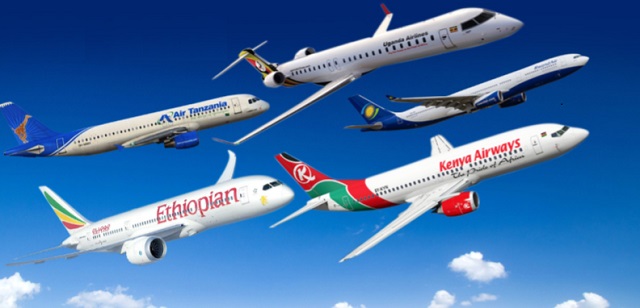
Covid-19 pandemic has taken a heavy toll on Africa’s airlines, but some analysts suggest that a more streamlined industry offering better services could emerge
| CHARLIE MITCHELL | After gaining independence, the old saying went, African countries first needed a currency, then an anthem, then an airline. Currently, airlines – big and small remain vital branding tools for African nations.
But many have been run with a survival-at-all-costs mentality and were in financial distress even before the coronavirus pandemic struck.
Air Zimbabwe, for instance, was indebted to the tune of $300m, while South African Airways was in a bankruptcy protection process. The pandemic, which grounded planes across the world, has pushed many African airlines to the brink of collapse.
Most are now wondering how long they can continue to operate unless cash-strapped governments step in. Yet some experts suggest Covid-19 could spur the upheaval African aviation needs to streamline the industry, weed out its weakest performers, improve regulations and, ultimately, improve service for customers.
“Covid changed nothing, it just accelerated stuff,” says Andrew Charlton, the managing director of Aviation Advocacy, a consultancy. “Those airlines that survive are going to be worthy survivors.”
Air traffic plummets
In October, the International Air Transport Association (IATA) downgraded its Africa travel forecast for 2020 to reflect plummeting traffic. The continent is expected to hit 30% of 2019 passenger levels, down significantly from the 45% IATA projected in July. That means Africa will see just 45m travellers this year, compared to 155m in 2019.
“The further fall in passenger traffic in 2020 is more bad news for the aviation industry in Africa,” said Muhammad Albakri, IATA’s regional vice president for Africa and the Middle East, in a statement. With international travel remaining virtually non-existent and a slower than expected pick-up in domestic travel, we have revised our expectations downward.”
A full return to 2019 levels is not expected until late 2023, while demand in 2021 is expected to strengthen to 45% of 2019 levels, or around 70m passengers.
At the onset of the pandemic, much of the world shut borders and cancelled flights. Tourism ground to a halt, as did business travel. Cargo transport was slashed, although it resumed more quickly. Most African airlines, including Air Kenya and low-cost domestic airlines, such as CemAir and Airlink, resumed domestic flights in July, although traffic is yet to pick up.
Meanwhile, the world has adapted to new business practices, with video conferencing likely to replace in-person meetings for some time to come. The same applies to conferences, which draw millions to Africa each year. The pandemic will also impact “hubbing”, the dominance of hub airports such as Addis Ababa and Johannesburg, with passengers unwilling to transfer in busy airports and instead seeking direct flights to specific destinations, including secondary cities.
The collapse in air travel has devastated airline balance sheets. Revenue losses sector-wide are expected to reach $6bn, putting 7.7m African livelihoods at risk, according to IATA. Aviation-sector related GDP, meanwhile, could dip as much as $37bn. Four African airlines have already ceased operations due to the pandemic, while those still operating are in acute financial distress.
South African Airlines, which has not made a profit since 2011, filed for bankruptcy protection in December 2019, even before the pandemic began. Although Pretoria said in April it would not continue to fund the loss-making airline, the national treasury bailed out the company with an injection of $641m, arguing that setting it on a path to recovery would tempt private investors. Ethiopian Airlines, Africa’s biggest carrier, reported revenue losses of $550m in the first quarter of 2020.
Among those that closed are SA Express, a budget South African carrier, which was placed under provisional liquidation in April, and Air Mauritius, which entered voluntary administration in April and expects cumulative losses of $225m by next March.
Airlines expand
Despite the dire circumstances, some airlines are pressing ahead with expansion, hoping to carve out space in the post-Covid market. Air Senegal, for instance, plans to launch new routes to London, Geneva and the United States. Uganda Airlines, which started flights to Kinshasa in the Democratic Republic of Congo on Dec.18, plans to connect Johannesburg, Dubai, London and some Chinese cities using the newly acquired Airbus A330-800Neo in 2021. Currently, Uganda Airlines flies in eight destination across the East African region.
Some airlines have attempted to patch the wound with cargo. For the first time in its history, SAA Cargo, the national carrier’s freight division, operated a passenger aircraft for a cargo trip. However, roughly 45% of all air freight is normally carried in the holds of passenger airlines.
Until passengers return to the skies in large numbers, revenues will continue to shrink. Addressing the African Airlines Associations (AFRAA) in November, Alexandre de Juniac, director general of IATA, said: “We are in the middle of the biggest crisis our industry has ever faced. As leaders of Africa’s aviation industry, you know that first-hand. Airline revenues have collapsed. Fleets are grounded. And you are taking extreme actions just to survive.”
Across the world, governments have stepped in with financial aid to assist their struggling carriers. In March, Singapore piled $13bn into its national airline. African governments, too, have offered financial assistance. The governments of Côte d’Ivoire, Senegal, Rwanda and Burkina Faso have pledged a total of $311m, while $30bn has been promised by other governments, international lenders and other institutions, such as the African Development Bank, African Export Import Bank and the African Union.
Despite the large promises, most of the relief is yet to reach the companies that need it. “Pledges do not pay the bills, and little of this funding has materialised,” said de Juniac.
 The Independent Uganda: You get the Truth we Pay the Price
The Independent Uganda: You get the Truth we Pay the Price



